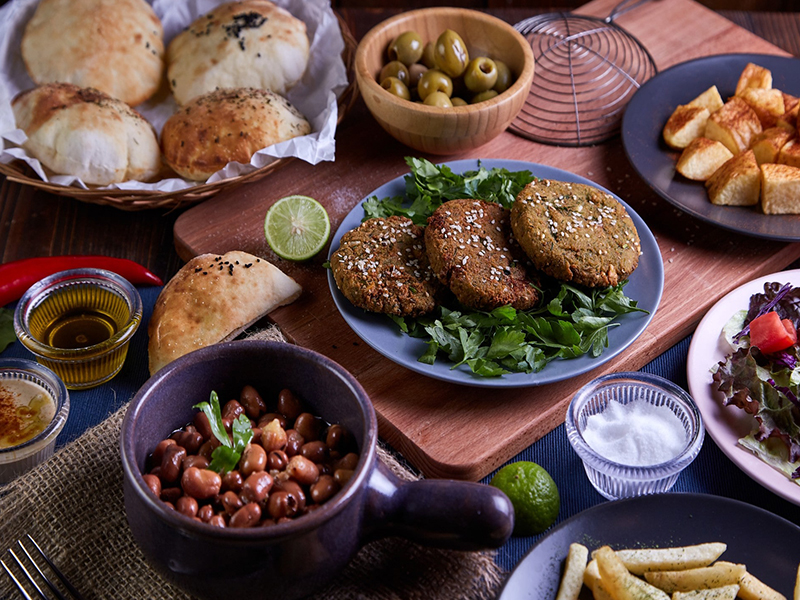Discover the flavorful world of Egyptian breakfast—from hearty beans and flaky bread to tangy pickles and sweet teas. This guide shows you what to expect, where to try it, and how to start your day like a local.

Historical Background
Breakfast in Egypt is less about rushing and more about fueling the body and soul. Rooted in agricultural tradition and family culture, Egyptian mornings are marked by shared plates, fresh ingredients, and a generous sense of hospitality. Whether on a rooftop in Luxor or a bustling Cairo street corner, the first meal of the day is a celebration of simplicity and satisfaction.
Many classic Egyptian breakfast dishes date back thousands of years. Ful medames, for example—slow-cooked fava beans seasoned with lemon, garlic, and olive oil—was eaten by ancient Egyptians and remains a national favorite today.
Cultural Significance
Egyptian breakfast reflects the country’s communal spirit. It’s common to share food, pass plates, and sit together around a spread of small dishes. The variety is part of the joy—salty, sweet, spicy, and fresh all in one sitting. Even in modern times, locals prefer traditional staples over fast food.
You’ll find these meals in homes, at roadside cafés, in markets, or at hotel buffets tailored for tourists. But if you want to eat like a true Egyptian, it’s all about ful, falafel, baladi bread, and a strong cup of black tea.
🍽️ What’s on a Traditional Egyptian Breakfast Table?
-
Ful Medames (فول مدمس): Fava beans stewed with olive oil, cumin, and lemon
-
Ta’ameya (طعمية): Egyptian falafel made from crushed fava beans and herbs
-
Baladi Bread: Thick, whole wheat flatbread used to scoop up food
-
Eggs: Often boiled, scrambled, or fried with tomato and onion
-
Pickled Vegetables & Olives: Sharp, salty flavors to balance the beans
-
White Cheese (Gibna Domiati): Soft, salty cheese with tomato or cucumber
-
Honey, Molasses & Tahini: A sweet spread combo served with bread
-
Tea (Shay): Always black, sometimes with mint or lots of sugar
📍 Where to Try It
-
Cairo:
-
Zooba (Zamalek or Maadi) – modern twist on local classics
-
Felfela (Downtown) – iconic for tourists and locals alike
-
Street cafés in Islamic Cairo or Khan El Khalili
-
Luxor & Aswan:
-
Nubian Village:
✨ Unique Experiences
-
Photography Tip:
Snap your breakfast spread from above—especially if you're eating outdoors. The variety of color, texture, and dishware is Instagram gold.
-
Local Insight:
Say “Ayez ful mazboot we ta’ameya” to order beans and falafel like a local! ("I want ful, perfectly done, and falafel!")
✅ Quick Facts Box
📍 Where: All across Egypt
⏰ When: Breakfast typically eaten between 7–10 AM
🍴 Vibe: Communal, fresh, and hearty
💸 Cost: 10–60 EGP depending on location
🌿 Vegan Friendly? Yes! Ful and ta’ameya are 100% plant-based
Conclusion
Eating breakfast in Egypt is more than just starting the day—it’s sharing a table with history, community, and flavor. Whether you’re enjoying it in a guesthouse in Luxor or at a café in bustling Cairo, this morning meal is one you won’t forget.
Ready to Explore?
Let Luxor Booking Tours take you deeper into Egypt—from the temples to the tea tables. Ask us about morning market visits or city tours that include traditional breakfasts and local cafés!
🔗 Links & Further Reading
-
🌄 Want a sunrise experience? Try our Hot Air Balloon Ride & Local Breakfast Tour
-
🌿 Read more: Live Like a Local in Egypt
-
📸 Cairo Food Tours Coming Soon!
✍️ Author’s Note
“There’s something magical about starting your day with fresh baladi bread, creamy fava beans, and laughter from the next table over. Breakfast in Egypt always reminds me that the best moments are often the simplest.”